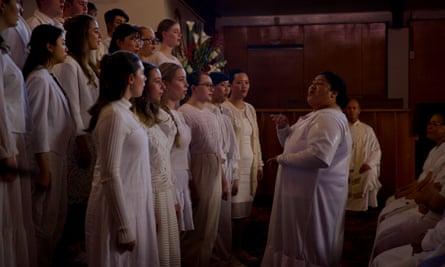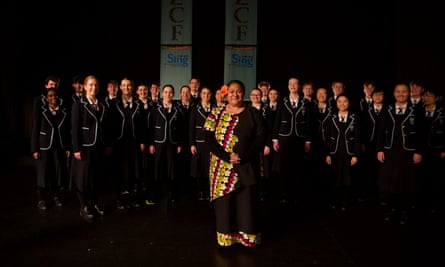Days after Tinā premiered in February, lead actress Anapela Polataivao’s 80-year-old aunt stood up in church and implored her congregation to see the film.
“She said, ‘I’m not here because she’s my niece, I’m here because it represents us,’” says Polataivao. “I love that for the older generation, it’s gifting that to them. It’s reflecting the way they’ve taught us back at them.”
Tinā follows Mareta Percival, a choir teacher grieving her daughter’s death in the 2011 Christchurch earthquake, who begins working at an elite, predominantly white private school. Despite racist opposition from the school’s leaders, she starts a school choir, changing the lives of her students as they work towards a real-life high school competition in New Zealand called The Big Sing. It’s a big-hearted tear-jerker about the power of art – and it’s already breaking records in its home country, where it’s received the widest-ever release for a local film and become the sixth-highest grossing New Zealand film of all time.
At its Auckland premiere at the Civic Theatre, the standing ovation continued until the credits had finished rolling. Polataivao – alongside writer, producer and director Miki Magasiva – has been overwhelmed by the response, hearing countless stories of people returning to the cinema with their families in tow; one woman told Polataivao she’d seen it five times. “Our elderly, Pacific specifically, are now going to the theatre,” says Polataivao. “[My aunt] said, ‘I don’t remember the last time I went to a film, you know.’”
Even in its earliest stages, Magasiva knew he had something special – even if others took longer to cotton on. “It had music littered throughout, comedic elements, the fish-out-of-water story, the teacher-student story, a clash of cultures. I was like, ‘Surely, this is going to be an easy sell,’” Magasiva laughs. “Oh, man, it was not an easy sell.”

The main hurdle was casting. Like previous local successes Boy and Whale Rider, Magasiva wanted authentic, local actors – but investors disagreed. “If we said we were going to attach one big actor from Hollywood, it would have gone through without any challenges,” he says. He hopes Tinā’s success proves New Zealand films don’t need celebrity backing: “It does not guarantee local success.”
Magasiva, who was born in Samoa and raised in Wellington, has spent the past 20 years building his career as a director of short films, television and commercials. Tinā is his debut feature, born from a video of a high school choir performing at The Big Sing 2013. Watching them sing Maunga e ole Atuolo, a traditional Samoan love song, Magasiva was struck that even though the choir was largely made up of palagi (white), east Asian and south Asian students, the comment section was flooded with Pacific Islanders celebrating the performance.
“I just had this overwhelming sense of pride, not only to be Samoan, but to be a New Zealander as well. Seeing palagi and Asian students performing a part of my culture so well … I felt like crying. I thought, ‘If I can feel like that in a three-minute video, imagine what I can do with a movie.’”
From there, Magasiva devised his story of a Samoan music teacher working across cultural and class divides. Polataivao, then teaching at the now defunct Pacific Institute of Performing Arts, initially came on board to help develop the character of Mareta, without knowing that Magasiva always intended to offer her the part. Though she’d worked between theatre, screen and teaching for 25 years, Polataivao still had some insecurities to shake.
“We’re in a marketplace now where you’re just so in the mix of young, beautiful, thin people, you could easily be going, ‘Is that the standard? Do I need to be this way?’” she says. “But of course, everyone has a different perspective to share.”

Magasiva sought to imbue Tinā with that collaborative philosophy, positioning the harmonic nature of a choir as a direct counter to the siloed pressures of private education. Early in the film, the headmaster says the school encourages “individual excellence,” which is antithetical to how Mareta teaches.
“We could learn something from the traditional value system of thinking,” says Magasiva. “In not only Samoan culture, but many indigenous cultures around the world, it would be: serve your community before you serve yourself; be a bit more forgiving.”
Throughout the film, Mareta endures a spectrum of racism: from loaded comments about her Samoan attire to a student outright yelling a slur in her face. Everything in the script is based on real experience, says Magasiva.
“Not only does [New Zealand] have this history, but we continue to have it today,” he says. “I’ve heard people calling me [the N-word], or coconut. I spoke to a teacher trying to go for a more senior position who [was told outright], ‘No, a Pacific female like you won’t get that position.’” It’s a reality Magasiva wanted to capture truthfully, without letting it overshadow the story. “That’s not what the movie is about – it’s about forgiveness, and acceptance of culture.”
For Polataivao, it’s Tinā’s authenticity that underscores its universal appeal. “We as Pacific Islanders are so freaking unique. We have a different way of laughing at ourselves, and we’re unique in terms of our rhythms, the way we are, the way we speak,” she says.
“It’s reflected in the amount of feedback I’ve had for Mareta’s character. [People say] ‘That’s my mum. That’s my aunt. Thank you so much.’”
-
Tinā is out in Australian cinemas 1 May
Source: theguardian.com

















